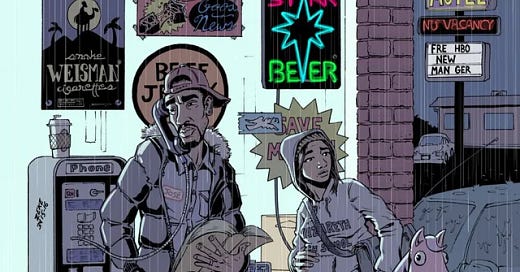To be a human being is to first and foremost recognize that God became one of us in Jesus Christ.
- Stanley Hauerwas
I don’t know why but we evangelicals sure tend to squirm as soon as someone talks about Jesus as “a victim”. If you don’t believe me - just try calling Jesus “a refugee” on social media and see how offended (and defensive) some western evangelicals get.
Perhaps it’s because some of us can’t stomach the idea of “God as victim”. Perhaps it’s because of the muscular Jesus & John Wayne type of Christianity many western Christians are conditioned to. Perhaps it’s because many of us don’t want to see in God what we see in ourselves: fragility, humanity and meekness. After all, what good is a meek Saviour? And how powerful could a victim-God really be?
Even some of my favourite western theologians like John Stott (in his wonderful book that I’d still highly recommend - The Cross of Christ) refuse to call Jesus “a victim”. According to some of these evangelicals, Christ cannot be a victim and a victor at the same time.
In things like this, it’s helpful to take a step back and look at the hard facts. Was Jesus not a brown, middle-eastern, colonized Jewish human from the wrong part of the country? Did Jesus not live as a working class, homeless Rabbi for most of his ministry? Was he not betrayed by those closest to him? Was he not unjustly convicted and executed by a corrupt government leader who stood spineless against a lynching mob?
If we can accept Luther’s words that we are ‘Simul Justus et Peccator’ (at once justified and a sinner), why can we also not accept that Jesus is at once a victim and a victor?
If we can accept that Jesus was fully human and fully divine, why can we also not accept that the same Jesus who was a victim of injustice in his humanity was also a victor against injustice in his divinity?
Many western evangelicals like to skip past Jesus’ victimhood and meekness as someone born into a colonized, brown refugee family fleeing violence.
Many western evangelicals like to skip past Jesus’ victimhood and meekness as someone torturously murdered as an innocent brown, colonized victim of state violence at the hands of colonizers.
But when we do this, we’re not allowing Jesus and his Good News to feel like good news for people who are oppressed. If we’re going to love our neighbours well by seeking justice, we must first learn to sit in the discomfort of Jesus’ status as someone born into and killed by injustice.
This is why we need more theology from the margins: theology from communities who identify with Christ’s status as a victim of injustice just as much as they derive hope from his status as the ultimate victor against injustice.
I get why many of us are averse to focusing on the meekness of our saviour but perhaps this is the whole point of the Christmas Story: A meek saviour who came not as a warrior but as a baby; not in a palace but in a manger; not to a wealthy home but to a family fleeing violence.
If each of us bear the Imago Dei (image of God), we should hope to see in God some of what we dread to see in ourselves and our neighbours. Perhaps this is also the point of the incarnation of Christ through the Christmas story.
What if, in addition to teaching us to love God, Jesus also came to teach us to love those made in the image of God? And what if he did this by embodying the very attributes we look down upon the most as human beings? Specifically - meekness, fragility & victimhood.
As we go from Christmas to Easter, may we spend time reflecting on Christ’s meekness, fragility & victimhood displayed through his humanity on earth. And let’s be okay with sitting in the discomfort and awkwardness of all that.





I love this so much. Yes, Jesus can be both victim and victor, and it would improve how we minister to others to see him as such.
Well said, Sarah! There are definitely ministry implications to what we believe on this.